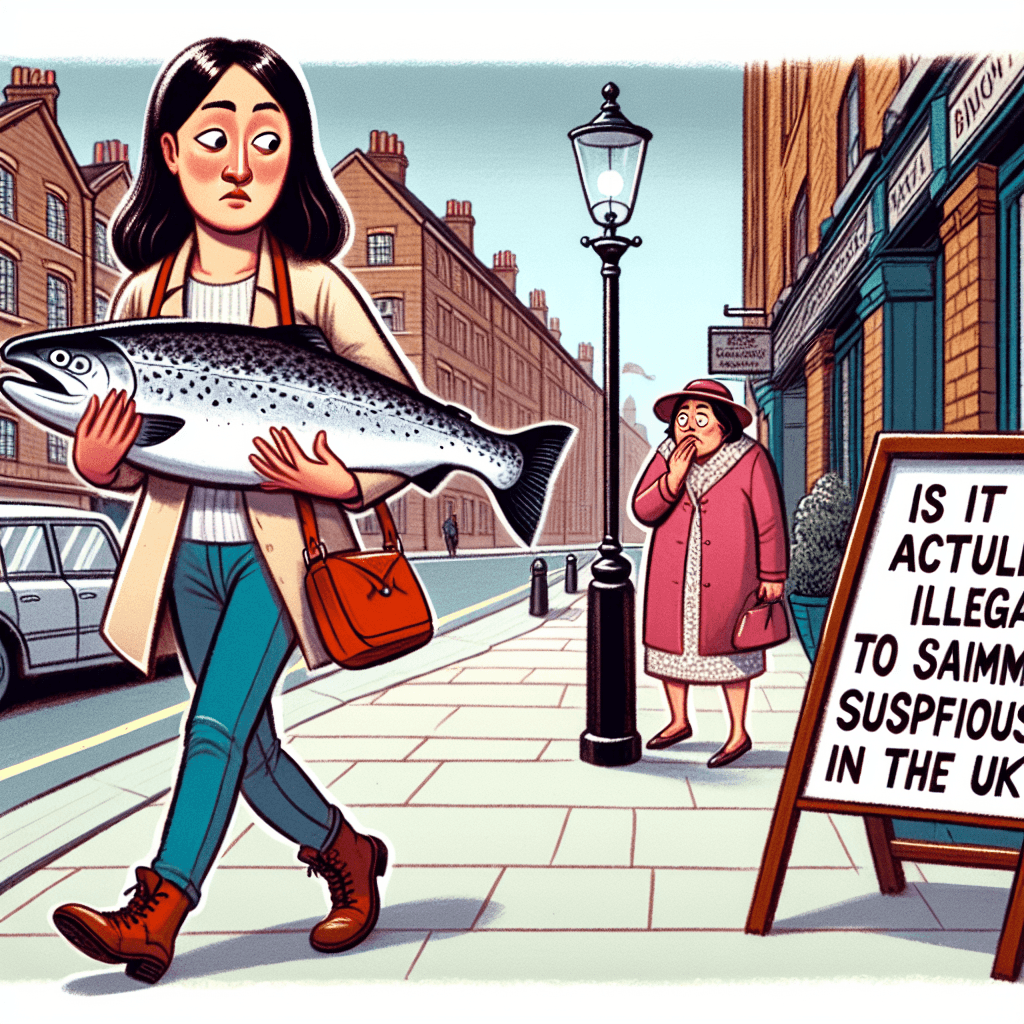Fact or Fishy Fiction: The UK's Bizarre Salmon Law
Handling a salmon "in suspicious circumstances" is a genuine crime in the UK. We're untangling this bizarre piece of legislation to find out what’s fact, what’s fiction, and if you could accidentally get caught.


Too Long; Didn't Read
TLDR: The UK law making it illegal to handle a salmon in suspicious circumstances is real. However, it's an anti-poaching law from the Salmon Act 1986, targeting illegally obtained fish, not just holding one in a strange way.
Unhooking the Truth: Is it Actually Illegal to Handle Salmon Suspiciously in the UK?
Ever stumbled across lists of bizarre UK laws and seen one mention handling salmon in suspicious circumstances? It sounds delightfully absurd, conjuring images of shady characters lurking by riversides with trench coats full of fish. But is this quirky regulation just a relic of the past, or is there genuine legal weight behind it? The idea that simply handling a fish suspiciously could land you in trouble certainly raises eyebrows. This post dives into the specifics of this oft-quoted law, exploring its origins, what it actually means, and whether you genuinely need to worry about looking shifty with a salmon.
The Law Behind the Lore: Section 32 of the Salmon Act 1986
The source of this fascinating legal tidbit is Section 32 of the Salmon Act 1986. Titled "Handling salmon in suspicious circumstances," the law is very real. However, the wording isn't quite as vague as popular summaries might suggest.
The Act states it is an offence for any person to receive or dispose of any salmon "in circumstances where they believe or it would be reasonable for them to suspect that a relevant offence has been committed in relation to the salmon."
Key points to understand here are:
- It's not just any handling: The focus is on receiving or disposing of salmon (e.g., buying, selling, processing).
- The "suspicion" relates to illegality: The core issue is whether the handler suspects, or should reasonably suspect, that the salmon was obtained illegally – typically through poaching (fishing without a license, using illegal methods, or fishing out of season).
- Burden of Proof: Crucially, this section shifts the burden of proof. If you're caught with salmon under suspicious circumstances, it's up to you to demonstrate that you acquired the fish legally, rather than the prosecution proving it was poached initially.
Why Was This Law Created? Tackling Poaching
The Salmon Act 1986 wasn't designed to criminalise nervous fishmongers. Its primary aim was, and remains, to combat the serious issue of salmon poaching and the illegal trade in salmon. Salmon populations have faced significant pressure from various factors, including habitat loss, pollution, and overfishing. Poaching exacerbates these problems.
Before this Act, prosecuting poachers could be difficult if they weren't caught red-handed actually fishing illegally. Section 32 was introduced to target the entire chain of illegal supply. By making it an offence to handle fish believed to be illegally caught, the law makes it riskier for individuals and businesses (like hotels, restaurants, or fish dealers) to buy salmon from dubious sources, thereby disrupting the market for poached fish.
What Constitutes "Suspicious Circumstances"?
The law doesn't provide an exhaustive list, as "reasonableness" depends on the context. However, circumstances that might be deemed suspicious could include:
- Buying salmon "off the back of a lorry" or from an unlicensed individual at a drastically reduced price.
- Receiving salmon late at night or in unusual locations.
- Handling fish that show signs of illegal capture methods (e.g., spear marks, gill net marks where such netting is illegal).
- Dealing with large quantities of salmon without appropriate documentation or licenses.
- Being unable to provide a credible explanation for how the salmon was obtained.
Essentially, if the situation would make a reasonable person question the legality of the salmon's origin, it likely falls under the scope of Section 32.
Still Relevant Today?
Absolutely. While it might sound archaic, Section 32 remains an important tool for fisheries enforcement agencies like the Environment Agency in England, Natural Resources Wales, and Police Scotland’s wildlife crime units. It continues to be used in prosecutions related to the illegal salmon trade. Poaching methods evolve, and illegal sales can move online, but the principle of targeting those who handle illegally sourced fish remains a key strategy in protecting vulnerable salmon stocks.
So, while the phrasing "handling salmon suspiciously" makes for an amusing headline, the underlying law serves a serious conservation purpose.
Conclusion: More Than Just a Fishy Tale
So, is it illegal to handle salmon suspiciously in the UK? Yes, but with important context. The law, specifically Section 32 of the Salmon Act 1986, targets the handling (receiving or disposing) of salmon where there's reason to suspect it was illegally obtained, primarily through poaching. It's not about looking awkward while carrying your legally purchased dinner home from the supermarket. This legislation plays a vital role in combating the illegal fish trade and protecting vulnerable salmon populations by making it harder for poached fish to enter the market. While often cited as a quirky law, its purpose is rooted in serious environmental crime prevention and conservation efforts.


